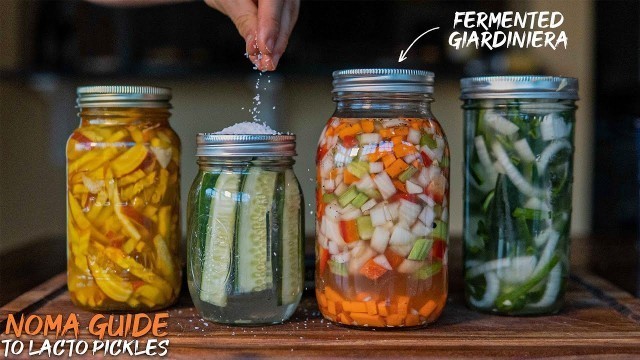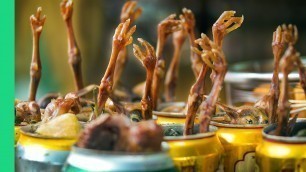

'Support my work on Patreon: https://www.patreon.com/EthanC - Noma Guide to Fermentation: https://amzn.to/2mXDD3X Today, I\'m going to be cover the Noma guide to lacto fermenting in a brine, or simply put, how to pickle. And the coolest thing about this process is that it can be used to pickle anything you please, so experiment away. ------------------------------------------------------------------------------------------- --- BASIC Noma LACTO PICKLE PROCESS --- 1. Place empty crock or jar on a scale and tare or zero the scale. 2. Fit the vegetables snugly into the vessel 3. If you want to add any additional spices (bay leaves, mustard seeds, peppercorns, etc.). See the video for ideas. 4. Add enough water to submerge the vegetables and note the weight down. 5. Calculate 2% of that weight, and weigh out that much salt into a bowl. (MAKE SURE you calculate and weigh exactly for safety, you can go above 2% but do not go below.) 6. Pour the water out from the vessel and mix the salt until it’s dissolved. 7. Pour the saline solution back over the vegetables. 8. Cover with the cap, and lightly screw on the cap, allowing nothing to enter, but loose enough that gas produced from fermentation can still escape. 9. Now it is time to wait. Normally, just leave them at room temperature, though Noma does their ferments at 82 F. You can ferment in the fridge, though it will ferment at a much slower pace. 10. If fermenting at room temperature, you want to start checking on the pickles after 2-3 days and monitor the progress for sourness. 11. Once the pickles have reached the desired sourness. Move to the fridge, screw the cap tight, and it will store in the brine for several months for you to enjoy. Fermentation seen in this video: --- Fermented Hot Giardiniera --- Equal parts (all diced) - Celery - Carrot - Onion - Red pepper Spices - 2 cloves garlic - 2 red hot chiles - 5 grams oregano - 5 grams peppercorns --- Golden Beets & Garlic --- - 2 Golden beets, julienned - 2 cloves garlic, crushed --- Onions & Poblanos --- - 1/2 large white onion, sliced - 2 poblano peppers, julienned ------------------------------------------------------------------------------------------- OTHER DETAILS All sources used: PROCESS- The Noma Guide to Fermentation BOTULISM - https://www.fsis.usda.gov/wps/portal/fsis/topics/food-safety-education/get-answers/food-safety-fact-sheets/foodborne-illness-and-disease/clostridium-botulinum/CT_Index BOTULISM - Noma guide to fermentation (Pg 62) BOTULISM - https://www.cdc.gov/botulism/surv/2017/index.html KAHM YEAST - http://phickle.com/the-wrath-of-kahm/ Music: Provided by Musicbed Filmed on: Sony a6400 w/ 18-105mm F4 Voice recorded on Rode Video Micro Edited in: Premiere Pro #NomaFerments Affiliate Disclosure: Cook with E is a participant in the Amazon Services LLC Associates Program, an affiliate advertising program designed to provide a means for us to earn fees by linking to Amazon.com and affiliated sites.'
Tags: botulism , lab , fermentation , fermented vegetables , fermented pickles , René Redzepi , noma , how to pickle , how to ferment , lacto fermentation , lacto fermented vegetables , Cook with E , lactic acid bacteria , fermented pickles recipe , noma fermentation , noma ferments , noma guide to fermentation , how to lacto ferment pickles , noma guide to fermentation book , how does lacto fermentation work , david zilber , fermenting in a brine , fermentation botulism
See also:

















comments